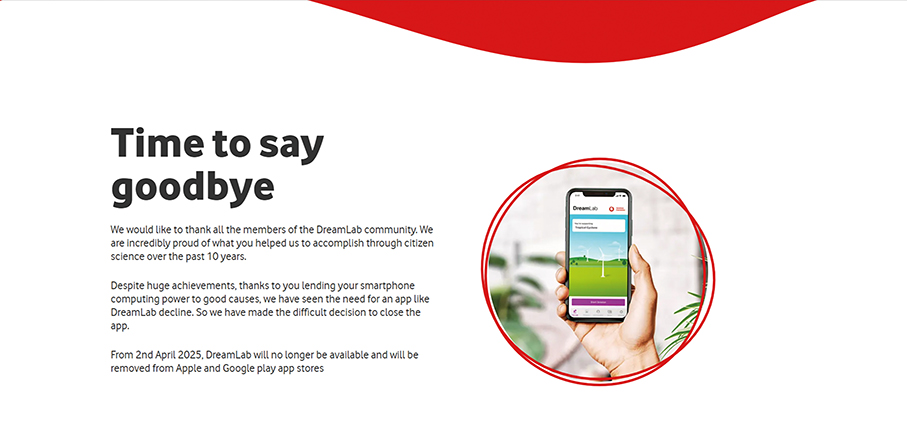Hoi Sio Hong, Form 4, Chan Sui Ki Perpetual Help College
DreamLab, an app that harnessed the processing power of smartphones to assist cancer, climate, and COVID-19 research while users slept, shut down on April 2. Volunteer computing, once a revolutionary model harnessing idle devices for scientific research, is facing a quiet decline. In today’s landscape, dominated by advanced commercial cloud services and ever-changing technology, volunteer computing* is increasingly seen as a relic of the past rather than a forward-looking resource. This article examines why such projects are fading into obscurity – and whether they can overcome existential challenges to reclaim relevance.
Why volunteer computing projects are fading
1. Obsolescence in favour of commercial supremacy
Modern Graphics Processing Units (GPUs) and cloud platforms have rapidly eclipsed the capabilities of volunteer computing. Projects once celebrated for their expansive reach, now seem outdated compared to the highly efficient, centralised AI and machine learning models available to today’s researchers. A stark example is the contrast between Folding@home, a volunteer-driven protein-folding project, and Google’s AlphaFold. AlphaFold leverages advanced AI algorithms that are faster, cheaper, and far more precise than distributed volunteer methods.
While Folding@home mobilised millions of devices during COVID-19, its impact pales against AlphaFold’s breakthroughs in predicting protein structures with near-atomic accuracy. The financial muscle and technological prowess of centralised, AI-driven systems underscore a harsh reality: volunteer computing struggles to compete in precision and speed.
2. Quality over quantity: The rise of curated data
Volunteer computing excelled at processing large datasets. However, these projects often prioritised volume over precision. AI demonstrates that smaller, high-quality datasets can yield breakthroughs without brute-force computation.
3. Security and privacy concerns
In an era of escalating cyber threats, distributing computations across loosely moderated personal devices raises significant risks. Volunteer projects are vulnerable to data breaches, malware infiltration, and malicious actors hijacking resources. For example, a compromised device in a climate modelling project could falsify results or leak sensitive data.
The path forward: Adaptation or irrelevance
From my perspective, the future of volunteer computing hinges on its ability to evolve in response to the relentless march of technological progress, shifting scientific priorities, and public expectations.
1. Embrace modern hardware
Volunteer computing must embrace modern hardware to remain relevant. Legacy code, optimised for outdated CPU architectures, should be rewritten to harness the power of modern GPUs in PCs and AI chips in smartphones. For instance, mobile applications like DreamLab could pivot to utilise the GPUs embedded within smartphone microprocessors, enabling faster and more energy-efficient computations.
2.Reignite public engagement through incentives
To compete in an era dominated by instant gratification, projects must innovate incentives that resonate with modern users. A bold approach could involve issuing blockchain-based tokens to reward participants for contributing compute time. These tokens could be redeemed for perks like exclusive research updates, digital merchandise, or even tangible rewards, blending altruism with tangible benefits.
3. Focus on crisis-driven and decentralised science
During the COVID pandemic, projects like Folding@home, which distributed the discovery of the viral structure, demonstrated how decentralised networks can rapidly scale to address global health crises. Therefore, volunteer computing should position itself as a “first responder” tool during emergencies, which would highlight its agility and societal value.
Conclusion: A crossroads for distributed science
The decline of volunteer computing reflects not a lack of potential, but a failure to adapt. While commercial supremacy and evolving data needs pose existential threats, the model’s decentralised ethos - democratising science and engaging the public – remains uniquely valuable. To survive, projects must modernise infrastructure, prioritise security, and reinvent incentives. The choice is stark: volunteer computing can either evolve into a hybrid model that complements centralised systems or fade into obscurity as a nostalgic footnote. By specialising in crisis response, leveraging modern hardware, and reigniting public passion, it could yet carve out a role as a resilient, decentralised pillar of 21st-century research. The shutdown of DreamLab need not be an epitaph it could be a wake-up call.
*Volunteer computing is a form of distributed computing where individuals donate their unused computing resources (CPU, GPU, or storage) to help perform large-scale scientific research or humanitarian projects. Instead of relying on supercomputers, these projects harness the collective power of thousands or millions of volunteer devices worldwide. - DeepSeek

Photo courtesy by Unsplash

This screenshot taken last night shows a message on the Vodafone website that notes that DreamLab is no longer available.









